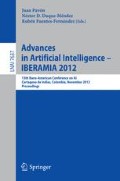Abstract
Virtual learning environments (VLEs) are used in distance learning and classroom teaching as teachers and students support tools in the teaching–learning process, where teachers can provide material, activities and assessments for students. However, this process is done in the same way for all the students, regardless of their differences in performance and behavior in the environment. The purpose of this work is to develop an agent-based intelligent learning environment model inspired by intelligent tutoring to provide adaptability to distributed VLEs, using Moodle as a case study and taking into account students’ performance on tasks and activities proposed by the teacher, as well as monitoring his/her study material access.
Access this chapter
Tax calculation will be finalised at checkout
Purchases are for personal use only
Preview
Unable to display preview. Download preview PDF.
References
Baziukaité, D.: Approach to an Adaptive and Intelligent Learning Environment. In: Elleithy, K., Sobh, T., Mahmood, A., Iskander, M., Karim, M. (eds.) Advances in Computer, Information, and Systems Sciences, and Engineering, pp. 399–406. Springer (2006)
Boff, E.: Collaboration in Learning Intelligent Environments mediated by a Social Agent Probabilistic. Ph.D. Thesis, Computer Science Course. Federal University of Rio Grande do Sul, Porto Alegre (2008) (in Portuguese)
Bordini, R.H., Hubner, J.F., Wooldridge, M.: Programming Multi-Agent Systems in AgentSpeak using Jason. Wiley, England (2007)
Bordini, R., Vieira, R., Moreira, A.F.: Fundamentos de Sistemas Multiagentes. In: Ferreira, C.E. (ed.) Jornada de Atualização em Informática (JAI 2001), vol. 2, pp. 3–44. SBC, Fortaleza (2001)
Conati, C.: Intelligent Tutoring Systems - New Challenges and Directions. In: 21st International Joint Conference on Artificial intelligence (IJCAI 2009), pp. 2–7 (2009)
Dillenbourg, P., Schneider, D.K., Synteta, P.: Virtual Learning Environments. In: Dimitracopoulou, A. (ed.) 3rd Hellenic Conference Information & Communication Technologies in Education, pp. 3–18 (2002)
Fagundes, M.: An Environment for Development of BDI Agents. Course Completion Work. Federal University of Pelotas (2004) (in Portuguese)
Frigo, L.B., Pozzebon, E., Bittencourt, G.: The Role of Intelligent Agents in Intelligent Tutoring Systems. In: World Congress on Engineering and Technology Education (WCETE 2004), pp. 667–671 (2004) (in Portuguese)
Giraffa, L.M.M., Viccari, R.M.: The Use of Agents Techniques on Intelligent Tutoring Systems. In: XVIII International Conference of the Chilean Society of Computer Science (SCCC 1998), pp. 76–83. IEEE (1998)
Lima, R.D., Rosatelli, M.C.: An Intelligent Tutoring System to a Virtual Environment for Teaching and Learning. In: IX Workshop de Informática na Escola, Campinas. Anais do XXIII Congresso da Sociedade Brasileira de Computação (2003) (in Portuguese)
Moran, J.M.: Computers in Education - Theory & Practice. Porto Alegre 3(1) (set. 2000); UFRGS. Postgraduate Program in Computer in Education, pp. 137–144 (in Portuguese)
Mozzaquatro, P.M., Franciscato, F., Ribeiro, P.S., Medina, R.D.: Modeling a Framework for Adaptation of Virtual Learning Environments Mobiles to Different Cognitive Styles. RENOTE - New Technologies in Education Journal 7(3) (2009) (in Portuguese)
Oliveira, C.L.V.: AutoExplC - Intelligent Tutoring System to Aid the Teaching of “C” Language Based on Learning by Self-Explanation of Examples. PUC, Campinas (2005) (in Portuguese)
Pereira, A.T.C., Schmitt, V., Álvares, M.R.C.: Virtual Learning Environments. Culture Bookstore (2007) (in Portuguese)
Silveira, R.A.: Ambientes Inteligentes Distribuídos de Aprendizagem. CPGCC da UFRGS, Porto Alegre (1998)
Russell, S., Norvig, P.: Artificial Intelligence - A Modern Approach. Prentice-Hall, Inc., New Jersey (2002)
Santos, C.T., Frozza, R., Dahmer, A., Gaspary, L.P.: DÓRIS - Pedagogical Agent in Intelligent Tutoring Systems. In: Cerri, S.A., Gouardéres, G., Paraguaçu, F. (eds.) ITS 2002. LNCS, vol. 2363, pp. 91–104. Springer, Heidelberg (2002)
Valente, J.A.: Computers in Education - Conform or Transform the School. p. 42 (2009)
Weinbrenner, S., Hoppe, H.U., Leal, L., Montenegro, M., Vargas, W., Maldonado, L.: Supporting Cognitive Competence Development in Virtual Classroom. In: 10th IEEE International Conference on Advanced Learning Technologies (ICALT 2010), pp. 573–577. IEEE (2010)
Wooldridge, M.: Reasoning about Rational Agents. The MIT Press, Cambridge (2000)
Wooldridge, M.: An Introduction to Multiagent Systems, 2nd edn. John Wiley & Sons Ltd., Hoboken (2009)
Zakrzewska, D.: Cluster Analysis in Personalized E-Learning Systems. Springer, Heidelberg (2009)
Author information
Authors and Affiliations
Editor information
Editors and Affiliations
Rights and permissions
Copyright information
© 2012 Springer-Verlag Berlin Heidelberg
About this paper
Cite this paper
Giuffra, C.E.P., Silveira, R.A. (2012). An Agent Based Model for Integrating Intelligent Tutoring System and Virtual Learning Environments. In: Pavón, J., Duque-Méndez, N.D., Fuentes-Fernández, R. (eds) Advances in Artificial Intelligence – IBERAMIA 2012. IBERAMIA 2012. Lecture Notes in Computer Science(), vol 7637. Springer, Berlin, Heidelberg. https://doi.org/10.1007/978-3-642-34654-5_65
Download citation
DOI: https://doi.org/10.1007/978-3-642-34654-5_65
Publisher Name: Springer, Berlin, Heidelberg
Print ISBN: 978-3-642-34653-8
Online ISBN: 978-3-642-34654-5
eBook Packages: Computer ScienceComputer Science (R0)

